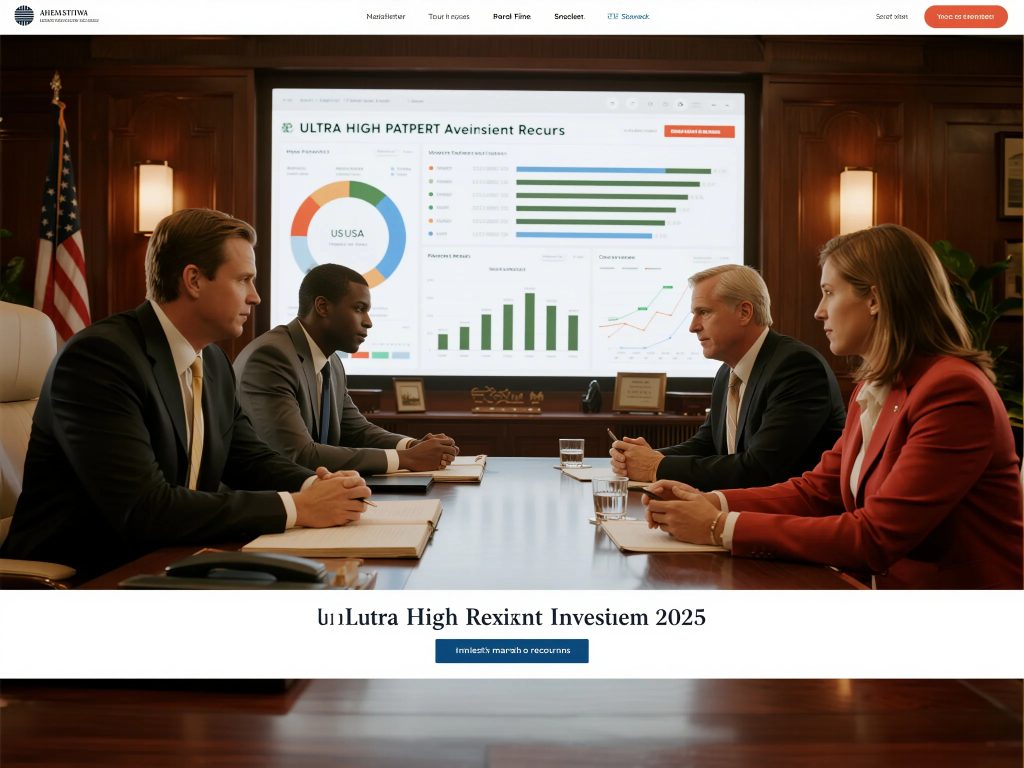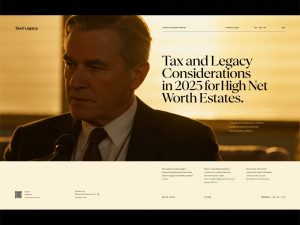Strategic Wealth Management Excellence: Navigating 2025 Investment Landscapes The landscape of wealth management for affluent individuals has undergone profound transformation, with ultra high net worth advisors USA developing increasingly sophisticated approaches to capital preservation and growth in an environment characterized by economic uncertainty, regulatory complexity, and rapidly evolving market dynamics. These specialized financial professionals combine deep technical expertise with
comprehensive understanding of client objectives to create tailored strategies that address both immediate financial needs and long-term legacy considerations. The fundamental premise of contemporary wealth management revolves around holistic financial planning that integrates investment management, tax optimization, risk mitigation, and estate planning into cohesive strategies designed to withstand market volatility while maximizing after-tax returns. Advanced analytical frameworks now incorporate scenario analysis, stress testing, and Monte Carlo simulations to evaluate potential outcomes across various economic environments and market conditions, ensuring that investment decisions are grounded in rigorous quantitative analysis rather than emotional reactions to short-term market movements. This methodological evolution reflects the maturation of wealth management as a discipline and the increasing sophistication of both advisors and clients in navigating complex financial landscapes while maintaining focus on achieving specific financial objectives and preserving family wealth across generations.The execution of comprehensive wealth management strategies demands exceptional coordination between specialized advisors, legal professionals, tax experts, and family office personnel to ensure seamless implementation and ongoing management of complex financial arrangements. The advisory process typically begins with thorough discovery sessions that explore client values, risk tolerance, time horizons, liquidity needs, and legacy aspirations to establish clear guiding principles for investment decisions and financial planning.
This foundational work informs the development of customized investment policy statements that articulate specific objectives, constraints, and governance frameworks while establishing measurable benchmarks for evaluating performance and progress toward financial goals. The documentation complexity associated with contemporary wealth management has increased substantially, with sophisticated trust structures, partnership agreements, and governance protocols designed to protect family interests while maintaining flexibility to adapt to changing circumstances and opportunities. The monitoring and reporting requirements have evolved to incorporate real-time performance dashboards, consolidated financial statements, and comprehensive family meetings that provide transparency into investment performance, facilitate informed decision-making, and ensure alignment with established objectives across multiple generations and stakeholder groups. These advancements in wealth management execution reflect the industry’s response to lessons learned from previous market cycles and the continuous pursuit of improved outcomes through disciplined investment processes, rigorous risk management, and proactive client service that addresses both financial and personal considerations throughout the wealth management relationship.Discretionary Portfolio Management: Sophisticated Execution for Complex Wealth
The implementation of comprehensive discretionary portfolio management strategies represents a cornerstone of modern wealth management for affluent families seeking professional oversight of investment portfolios while maintaining focus on personal and business priorities. Discretionary management arrangements empower experienced investment professionals to make timely decisions regarding asset allocation, security selection, and portfolio rebalancing based on pre-established investment guidelines and ongoing market analysis. This approach enables clients to benefit from professional expertise and institutional resources while avoiding emotional decision-making that often undermines investment performance during periods of market stress or exuberance. The governance framework typically includes detailed investment policy statements, regular performance reviews, and comprehensive reporting that provides transparency regarding investment decisions, portfolio characteristics, and progress toward financial objectives. The fee structures for discretionary management services have evolved to align advisor incentives with client outcomes, with many arrangements incorporating performance-based components that reward superior risk-adjusted returns while ensuring reasonable compensation for professional services rendered.
The evolution of discretionary portfolio management has been shaped by technological advancements, regulatory developments, and changing client expectations that have enhanced service quality, operational efficiency, and outcome transparency. The integration of sophisticated portfolio management systems, automated trading platforms, and advanced analytics tools has transformed investment processes, enabling more efficient execution, enhanced risk management, and improved performance monitoring across complex multi-asset portfolios. The client reporting capabilities have advanced significantly through interactive dashboards, mobile applications, and customized presentations that provide clear insights into portfolio performance, attribution analysis, and comparative benchmarking against relevant indices and peer groups. The investment philosophy underlying discretionary management emphasizes long-term wealth creation through disciplined asset allocation, strategic rebalancing, and opportunistic positioning based on thorough fundamental research and macroeconomic analysis. The risk management framework incorporates multiple layers of protection, including diversification across asset classes, geographies, and investment strategies; hedging techniques to mitigate specific risks; and liquidity management to ensure availability of funds for planned expenditures and unexpected opportunities. These developments have contributed to increased client confidence, improved investment outcomes, and enhanced advisor-client relationships built on trust, transparency, and shared commitment to achieving financial objectives through professional portfolio management services that adapt to changing market conditions and client circumstances over time.
Luxury Asset Investment Advisory: Preserving Value in Exclusive Markets
The specialized field of luxury asset investment requires exceptional expertise from luxury asset investment advisors who understand the unique characteristics, valuation methodologies, and market dynamics associated with high-value collectibles, real estate, and alternative investments that appeal to discerning affluent clients. Luxury assets encompass diverse categories including fine art, rare collectibles, vintage automobiles, luxury real estate, precious jewelry, and other valuable possessions that combine aesthetic appeal with investment potential and personal enjoyment. The advisory process for luxury assets involves comprehensive appraisal services, market analysis, acquisition strategies, and disposition planning that consider both financial returns and personal satisfaction factors unique to each client situation. The due diligence requirements extend beyond traditional financial analysis to include authentication verification, provenance research, condition assessment, and market trend evaluation to ensure informed decision-making and appropriate risk management. The storage, insurance, and maintenance considerations for luxury assets require specialized expertise and infrastructure that many traditional financial institutions cannot provide, creating opportunities for advisors with deep knowledge of these niche markets and established relationships with expert service providers.
The management of luxury asset portfolios demands sophisticated understanding of market cycles, collector psychology, and valuation principles that differ significantly from traditional financial markets characterized by different liquidity characteristics, transaction costs, and information availability. The investment characteristics of luxury assets include potential for capital appreciation, portfolio diversification benefits, inflation hedging properties, and non-correlation with traditional financial markets that can enhance overall portfolio resilience during periods of economic uncertainty or financial market stress. The advisory services typically include collection management, insurance coordination, restoration guidance, and exhibition planning that address both preservation and enhancement of asset value while accommodating client preferences regarding usage, display, and enjoyment of valuable possessions. The transaction execution for luxury assets often involves private treaty sales, auction participation, or exclusive brokerage arrangements that require discreet handling, sophisticated negotiation skills, and extensive network connections within specific collector communities and market segments. The reporting and documentation requirements emphasize detailed inventory management, valuation updates, and insurance coordination to ensure proper protection and accurate accounting for valuable assets within overall wealth management frameworks. These comprehensive luxury asset advisory capabilities enable affluent clients to build, manage, and enjoy valuable collections while integrating these assets into broader wealth preservation and transfer strategies that consider both financial objectives and personal legacy considerations across generations.

Private Client Portfolio Services: Comprehensive Wealth Solutions
The provision of sophisticated private client portfolio services has become increasingly essential for affluent individuals and families seeking integrated financial solutions that address complex wealth management needs through personalized service models and institutional-quality resources. Private client services typically encompass investment management, banking solutions, credit facilities, trust administration, and family office support delivered through dedicated relationship teams that coordinate various financial activities and provide single-point accountability for client service excellence. The service model emphasizes deep understanding of client circumstances, preferences, and objectives to deliver tailored solutions that optimize financial outcomes while minimizing complexity and administrative burden for clients managing substantial wealth across multiple jurisdictions and asset classes. The investment management component incorporates strategic asset allocation, manager selection, performance monitoring, and risk management activities executed through separately managed accounts, mutual funds, exchange-traded funds, and alternative investments that provide diversification and return enhancement opportunities. The banking and credit services include customized lending solutions, cash management, payment processing, and foreign exchange services that address liquidity needs and facilitate efficient financial operations for individuals and their business interests.
The execution of comprehensive private client services demands exceptional coordination across multiple specialized teams including investment professionals, banking specialists, trust administrators, and client service representatives to ensure seamless delivery of integrated solutions that address both immediate needs and long-term objectives. The technology infrastructure supporting private client services has advanced significantly through client portals, mobile applications, and digital reporting tools that provide convenient access to account information, transaction capabilities, and performance analytics while maintaining robust security protocols and privacy protections. The relationship management approach emphasizes proactive communication, regular reviews, and personalized attention that build trust, demonstrate commitment, and ensure ongoing alignment with client expectations and changing circumstances. The fee structures for private client services typically incorporate both asset-based charges for investment management and transaction-based fees for banking and specialized services, with transparency regarding costs, value delivered, and comparative benchmarking against industry standards and alternative service providers. The performance measurement framework includes absolute return targets, relative performance versus appropriate benchmarks, and risk-adjusted metrics that evaluate investment outcomes within context of client objectives and market conditions. These comprehensive private client service capabilities enable financial institutions to deliver exceptional value to affluent clients through integrated solutions that combine professional investment management, sophisticated banking services, and personalized attention that addresses complex financial needs while optimizing outcomes and enhancing client satisfaction through relationship-based approaches that prioritize client interests and long-term success.
Estate Planning Excellence: Preserving Legacy Across Generations
The complex discipline of estate planning high net worth individuals requires sophisticated expertise from legal, tax, and financial professionals who understand the intricate interplay between wealth preservation, tax optimization, and family dynamics that characterize substantial estate planning situations. Estate planning for affluent families involves comprehensive analysis of asset structures, ownership arrangements, and succession plans to develop strategies that minimize transfer taxes, avoid probate complications, and ensure smooth transition of wealth according to client wishes while addressing potential family conflicts and governance challenges. The planning process typically incorporates various legal instruments including wills, trusts, powers of attorney, and healthcare directives that provide clear guidance regarding asset distribution, decision-making authority, and end-of-life care preferences. The tax optimization aspects focus on leveraging available exemptions, utilizing valuation discounts, and implementing gifting strategies that reduce potential estate tax liabilities while maintaining flexibility to adapt to changing tax laws and family circumstances. The family governance components include family meetings, education programs, and communication protocols that promote understanding, alignment, and responsible stewardship of family wealth across multiple generations with diverse interests, capabilities, and aspirations.
The implementation of comprehensive estate plans demands meticulous attention to detail, sophisticated legal drafting, and careful coordination among various professional advisors to ensure proper execution and ongoing administration of complex arrangements designed to preserve wealth and family harmony. The documentation requirements include detailed trust agreements, corporate resolutions, partnership agreements, and beneficiary designations that must be carefully prepared, properly executed, and systematically maintained to ensure legal validity and operational effectiveness. The fiduciary selection process involves careful evaluation of individual trustees, corporate fiduciaries, and family members to identify appropriate parties to administer trusts, manage assets, and make decisions according to established guidelines and beneficiary interests. The funding strategies for estate plans require systematic transfer of assets into appropriate ownership structures, titling arrangements, and beneficiary designations that align with overall planning objectives while considering liquidity needs, control preferences, and administrative practicality. The review and update procedures incorporate regular assessments of plan effectiveness, tax law changes, family circumstances, and asset values to ensure continued relevance and optimal performance of estate planning strategies over time. These comprehensive estate planning capabilities enable affluent families to preserve wealth, minimize taxes, and transmit values across generations through carefully designed plans that address both technical requirements and personal considerations while providing peace of mind that loved ones will be properly provided for and family legacies will be preserved according to clearly expressed wishes and thoughtfully developed plans that withstand legal challenges and changing circumstances over extended time horizons.
Integrated Wealth Management: Combining Specialized Expertise for Optimal Outcomes
The convergence of specialized advisory services has created powerful opportunities for ultra high net worth advisors USA to deliver comprehensive solutions that address complex financial needs through integrated approaches leveraging complementary expertise, coordinated execution, and holistic perspective that considers both immediate requirements and long-term objectives. Integrated wealth management combines investment management, tax planning, risk mitigation, estate planning, and lifestyle services into cohesive strategies that optimize financial outcomes while enhancing personal satisfaction and family harmony. The integration process begins with comprehensive discovery that explores financial circumstances, personal values, family dynamics, and legacy aspirations to establish clear guiding principles for decision-making and priority setting across various planning domains. This foundational work informs the development of customized wealth management plans that articulate specific objectives, action steps, and responsibility assignments while establishing measurable metrics for evaluating progress and success over time. The implementation coordination requires exceptional project management, communication skills, and technical expertise to ensure seamless execution of various planning components through appropriate professional resources and service providers.
The ongoing management of integrated wealth strategies demands continuous monitoring, regular review, and proactive adjustment to address changing circumstances, new opportunities, and evolving objectives that characterize dynamic financial situations and family environments. The performance measurement framework incorporates both quantitative metrics regarding investment returns, tax savings, and wealth preservation as well as qualitative assessments of family communication, goal achievement, and overall satisfaction with advisory relationships and outcomes delivered. The technology infrastructure supporting integrated wealth management has advanced significantly through client portals, collaboration tools, and data aggregation platforms that provide comprehensive visibility into financial situations, facilitate informed decision-making, and enhance communication among various advisors and family members involved in wealth management processes. The fee structures for integrated services typically combine asset-based charges, fixed fees, and performance incentives that align advisor compensation with client success while ensuring reasonable compensation for comprehensive services delivered through coordinated teams of specialists. The relationship management approach emphasizes trust, transparency, and shared commitment to achieving client objectives through personalized service, expert guidance, and proactive attention to details that matter most to clients and their families. These integrated wealth management capabilities enable advisory firms to deliver exceptional value to affluent clients through comprehensive solutions that address complex financial needs, optimize outcomes across multiple dimensions, and enhance overall quality of life through professional guidance, coordinated execution, and ongoing support that adapts to changing circumstances and opportunities throughout long-term advisory relationships built on mutual respect, shared values, and demonstrated results.
Future Evolution: Adapting Wealth Management to Changing Realities
The wealth management industry continues to evolve rapidly, driven by technological innovation, regulatory changes, demographic shifts, and changing client expectations that create new challenges and opportunities for ultra high net worth advisors USA serving affluent clients with complex financial needs and sophisticated service requirements. The integration of artificial intelligence, machine learning, and advanced analytics into wealth management processes enables more sophisticated analysis, personalized recommendations, and enhanced client experiences through data-driven insights and automated workflows that improve efficiency and outcomes. The development of digital platforms for client collaboration, document management, and financial planning has transformed service delivery models, creating more transparent, accessible, and engaging experiences while maintaining necessary security, privacy, and personal attention that high net worth clients expect and deserve. The focus on sustainability, impact investing, and values-based allocation has influenced investment decision-making, with increased emphasis on environmental, social, and governance factors in portfolio construction, manager selection, and shareholder engagement activities that align investments with client values and societal concerns.
The future trajectory of wealth management will likely feature greater personalization, technological integration, and global coordination to address increasingly complex challenges facing affluent clients in volatile economic environments and rapidly changing social landscapes. The convergence of various financial disciplines will continue, with wealth managers incorporating insights from behavioral finance, family systems theory, and positive psychology to enhance client relationships, improve decision-making, and promote overall well-being beyond mere financial metrics. The regulatory environment will evolve to address emerging risks, protect client interests, and ensure industry professionalism through enhanced standards, increased transparency, and stricter enforcement mechanisms that maintain public trust and confidence in wealth management services. The competitive landscape will intensify through industry consolidation, technological disruption, and changing client preferences that reward firms delivering exceptional value, demonstrating authentic expertise, and building genuine relationships based on trust, integrity, and proven results. These evolutionary trends will shape the future of wealth management, creating opportunities for innovative advisors who embrace change, leverage technology, and remain committed to serving client interests through professional guidance, comprehensive solutions, and personalized service that addresses both financial objectives and personal aspirations throughout long-term relationships that transcend transactional interactions and become valued partnerships focused on achieving life goals and preserving family legacies across generations through thoughtful planning, disciplined execution, and adaptive strategies that withstand market cycles, regulatory changes, and personal transitions while maintaining focus on what matters most to clients and their families over extended time horizons.




